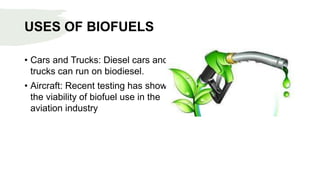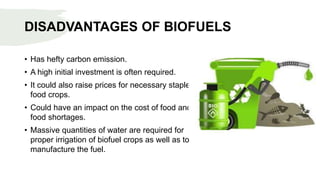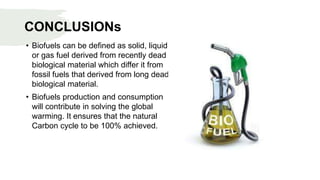Bio fuels 1
- 2. WHAT ARE BIOFUELS? • Biofuels are liquid fuels that have been developed from other materials such as plants or animal waste matter.
- 3. WHY BIOFULES? • Biofuels production and consumption ensures that it completely eliminates the continuous increase in Carbon Dioxide rates in the atmosphere which in turns will have the greatest effect on the environment and a way to end global warming
- 4. • For example, A crop of plants used to produce a barrel of biofuel will absorb exactly the same amount of Carbon Dioxide as emitted from burning the barrel produced.
- 6. TYPES OF BIOFULES • First generation biofuels 1. Bioalcohol 2. Biodiesel 3. Vegetable oil 4. Biogas 5. Syngas 6. Solid biofuels • Second generation biofuels
- 7. USES OF BIOFUELS • Cars and Trucks: Diesel cars and trucks can run on biodiesel. • Aircraft: Recent testing has shown the viability of biofuel use in the aviation industry
- 8. • Off-Road Equipment: A large percentage of off-road equipment use diesel fuel, making this equipment suitable for biodiesel use • Small Engines: Small engines, like those found in lawn mowers and chainsaws, can use ethanol blends up to 10 percent without problems
- 9. ADVANTAGES OF BIOFUELS • Cost: Biofuels have the potential to be significantly less expensive than gasoline and other fossil fuels. • Security: Biofuels can be produced locally, which decreases the nation's dependence upon foreign energy • Economic stimulation: Because biofuels are produced locally, biofuel manufacturing plants can employ hundreds or thousands of workers, creating new jobs in rural areas.
- 10. DISADVANTAGES OF BIOFUELS • Has hefty carbon emission. • A high initial investment is often required. • It could also raise prices for necessary staple food crops. • Could have an impact on the cost of food and food shortages. • Massive quantities of water are required for proper irrigation of biofuel crops as well as to manufacture the fuel.
- 11. CONCLUSIONs • Biofuels can be defined as solid, liquid or gas fuel derived from recently dead biological material which differ it from fossil fuels that derived from long dead biological material. • Biofuels production and consumption will contribute in solving the global warming. It ensures that the natural Carbon cycle to be 100% achieved.
- 12. • Using agriculture crops in their production results in increasing essential food crops' prices. • Many biofuels are now produced from organic wastes such as biodiesel which produced from cooking oils, methane from anaerobic digestion and ethanol from wood waste.
- 13. BIBLIOGRAPHY • http://en.wikipedia.org • https://www.google.com/search?q= bio+fuel • https://www.google.com/search?q= thank+you













